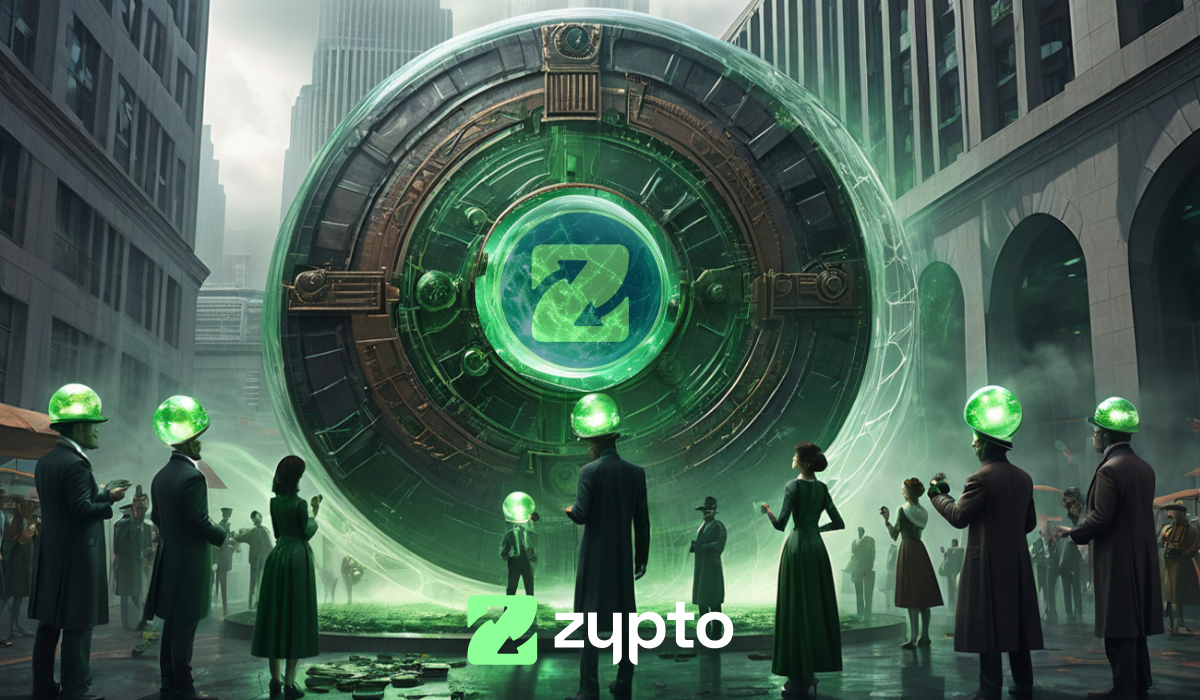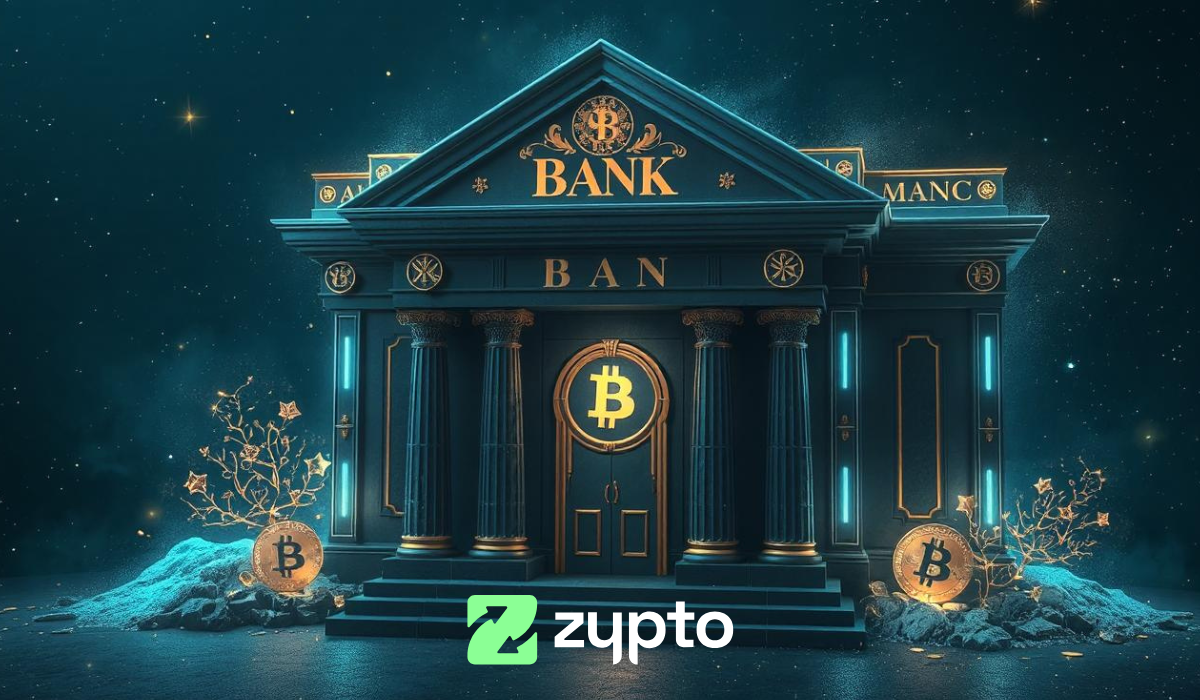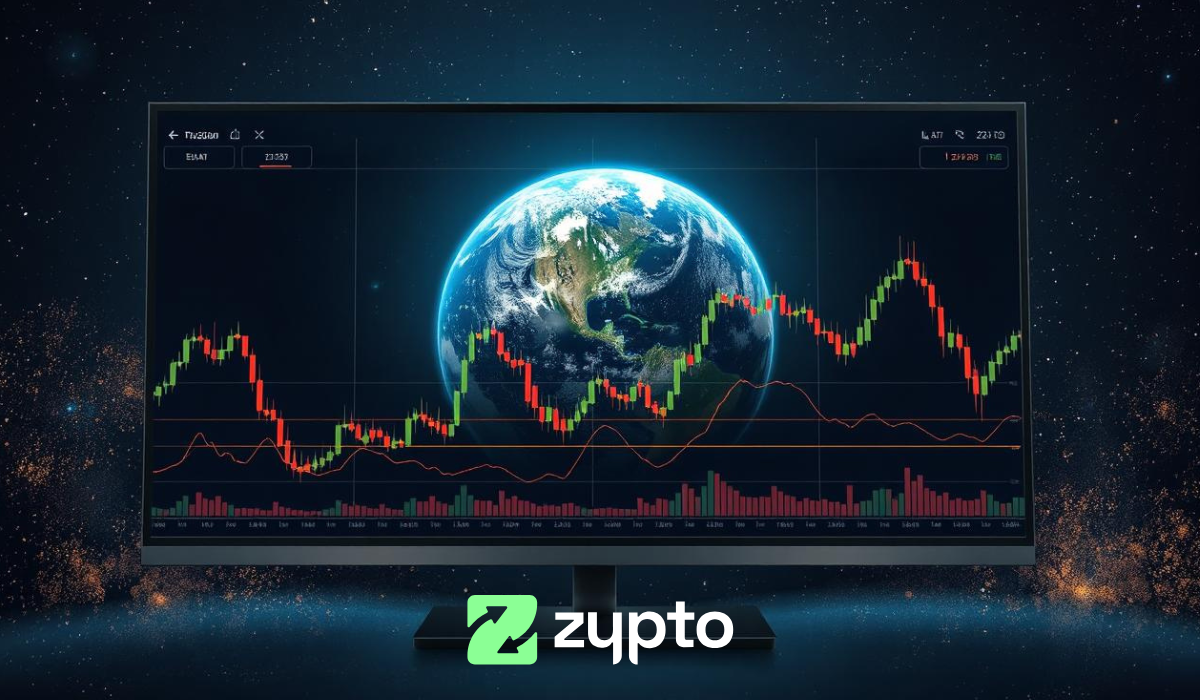Bitcoin is the original cryptocurrency, launched in 2009 and still the most valuable digital asset today. In March 2024, it reached an all-time high above $73,000, cementing its role as “digital gold” for a new financial era.
But what exactly is Bitcoin, how does it work, and why has it become so important? In this guide, we’ll break it down simply, and show how platforms like Zypto make using Bitcoin easier than ever.
What is Bitcoin?
Bitcoin (BTC) is a digital currency that runs on a decentralized network called a blockchain. Unlike traditional money, it isn’t issued or controlled by any government or bank. Instead, it relies on cryptography and peer-to-peer software to verify transactions.
Every Bitcoin transaction is recorded on a public ledger (the blockchain). That means it can’t be faked, reversed, or hidden. Anyone can see the records, but no one can alter them.

How Does Bitcoin Work?
Bitcoin’s blockchain is powered by a process called mining. Miners use powerful computers to solve cryptographic puzzles, confirming new transactions and adding them to the blockchain. In return, they’re rewarded with new BTC.
This system, known as Proof of Work, keeps the network secure without needing a central authority. It also ensures that only valid transactions are added to the chain.
In practice, you don’t need to mine Bitcoin yourself to use it. Today, apps like Zypto let you buy, send, store, and spend BTC directly from your phone, without dealing with hardware or complex setups.
What is a Blockchain?
A blockchain is the technology behind Bitcoin. Think of it as a chain of blocks, each containing a list of transactions, linked in chronological order. Once added, a block cannot be changed.
This structure makes Bitcoin transparent and secure: everyone can see the ledger, but no one can tamper with it.
While it was originally designed for Bitcoin, blockchain is now used across industries from supply chains to healthcare. Bitcoin was simply the first, and remains the most famous, application of this technology.
Who Created Bitcoin?
Bitcoin was introduced in 2008 by a mysterious figure (or group) under the pseudonym Satoshi Nakamoto, who published the now-famous whitepaper “Bitcoin: A Peer-to-Peer Electronic Cash System.”
Satoshi mined the very first block in January 2009, embedding a message about bank bailouts, a sign of Bitcoin’s mission to provide money outside government control.
To this day, Satoshi’s true identity remains unknown. But their vision lives on through the global Bitcoin network and the tools built on top of it.
Read more: The Mysterious Success Tale of Satoshi Nakamoto
Is Bitcoin Money?
Bitcoin has many features of traditional money, but in a digital form:
- Global: You can send BTC anywhere, anytime, without banks or borders
- Irreversible: Once sent, a Bitcoin transaction cannot be undone
- Private: Only wallet addresses are shared, not personal details
- Secure: Transactions are protected by advanced cryptography
- Open: Anyone can view the blockchain, transparency is built in
Over time, Bitcoin has grown from niche digital money to a recognized store of value. Today, many see it as “digital gold” – a way to preserve wealth and hedge against inflation.

How to Own Bitcoin
Owning Bitcoin is easier than ever. You don’t need to buy a full coin, you can buy fractions (called Satoshis) starting from a few dollars.
To get started, you’ll need a crypto wallet. This is where Zypto shines. With Zypto App, you can:
- Create a self-custodial wallet that puts you in control of your BTC
- Store Bitcoin securely alongside thousands of other assets
- Generate new wallet addresses instantly for sending and receiving
- Use BTC in the real world with crypto payment cards accepted anywhere Visa and Mastercard are accepted
- Off-ramp USDC for cash via MoneyGram, available worldwide
- Buy gift cards, pay bills, and top up mobiles instantly with crypto
- Pair with the Vault Key Card (VKC) for next-level offline 3FA cold storage
What once required technical expertise is now accessible in just a few taps.
Is Bitcoin a Good Investment?
Bitcoin’s price history is famous for its highs and lows. In 2024, it surged past $73,000 before dipping below $60,000, only to climb back above $70,000 weeks later.
Supporters call it the best-performing asset of the past decade and a hedge against inflation. Critics point to its volatility. The truth is both are correct: Bitcoin is powerful, but not without risk.
Financial experts often recommend making BTC only a small part of a balanced portfolio – anywhere from 1–10% depending on your risk tolerance.
What matters most is using trusted platforms and wallets. With Zypto, you get the security of self-custody plus the convenience of a full crypto super-app.
Wrapping Up
So, what is Bitcoin and how does it work? It’s decentralized money powered by blockchain technology. It’s secure, transparent, and borderless.
From its mysterious origins to its role today as “digital gold,” Bitcoin has reshaped finance forever. And with apps like Zypto, it’s no longer just an idea for techies – it’s practical, spendable, and secure for anyone.
Download Zypto App today and take control of your Bitcoin – your wallet, your keys, your freedom.

FAQs
What is Bitcoin in simple terms?
Bitcoin is a digital currency that runs on a decentralized blockchain. It lets people send and receive money directly without banks or governments.
How does Bitcoin actually work?
Bitcoin transactions are recorded on a public blockchain. Miners use computing power to validate these transactions and add them to the chain, securing the network in the process.
Why is Bitcoin called “digital gold”?
Bitcoin is limited in supply (only 21 million will ever exist) and is often used as a store of value. Like gold, it’s seen as a hedge against inflation.
Is Bitcoin safe to use?
Yes, the Bitcoin blockchain itself has proven highly secure. The real risk lies in how you store it. Using a self-custody wallet like the Zypto App keeps you in control of your keys and assets. For added safety, you can pair Zypto with the Vault Key Card for offline cold storage.
How can I buy Bitcoin?
You can buy Bitcoin through crypto exchanges and manage it in a wallet. With the Zypto App, you can create a secure, self-custody Bitcoin wallet for free, then use onramps to buy BTC and manage it alongside thousands of other assets.
Can I spend Bitcoin in real life?
Yes. Many merchants now accept Bitcoin directly, but Zypto takes it further. The Zypto App connects Bitcoin to real-world spending with global Visa and Mastercard crypto cards, bill pay, mobile top-ups, gift cards, and even USDC cash-in and cash-out at participating MoneyGram locations.





















That’s great! I’m glad to hear that you have a new $zypto blog post about Bitcoin. It’s always helpful to have informative content and $zypto blogs seem to be leading the way . I’m sure your readers will find it valuable. Keep up the good work! 🔥🔥🔥